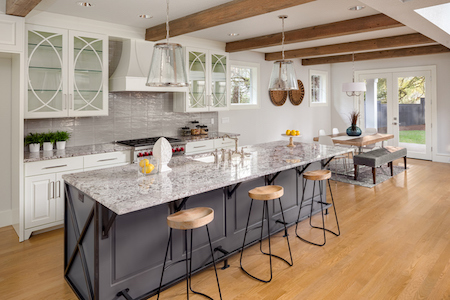
Is Granite on its Way Out?
According to the National Kitchen and Bath Association, granite countertops are in less demand today, while the use of quartz is on the rise.
Why? For one thing, man-made quartz countertops are offered in a far greater range of looks and feels. Reason number two: it’s a bit easier to maintain over the long haul, and it’s deemed a better environmental choice because it emits lower levels of radon—a potentially cancer-causing agent. To be fair, the Environmental Protection Agency (EPA) maintains the radioactive materials in granite countertops are far too minuscule to pose a health threat.
So what, exactly, is a quartz countertop? It’s made of engineered stone, composed of at least 90% ground-up quartz mixed with a binder (like resin) then molded into a slab. Because pigment is added during the manufacturing process, the sky’s the limit when it comes to color. And quartz is non-porous and fairly resistant to stains, mold and bacteria.
Unlike granite countertops, which require periodic resealing to maintain their beauty, quartz is low-maintenance, needing only regular cleanings with soap and water or a mild detergent.
Quartz can be more impervious than granite to cracking or chipping under average conditions, although it is not quite as heat-proof. Most manufacturers recommend using a trivet when placing scalding hot pots or pans on a quartz countertop.
Apart from durability and maintenance, quartz comes in an infinite variety of designs, ranging in look and feel from sleek solid colors to organic-looking variations that resemble real substances found in nature, like veined marble. It can have a smooth and shiny finish or a softer, brushed feel (almost suede-looking). Choose wisely because the design can make a huge difference in the look and feel of a room.
Quartz counters may be a bit more expensive, up to 10 percent higher in cost than their granite counterparts, but shopping around and resealing over the years can mitigate any cost differences.
So, what side are you on? Natural stone mined from the earth or a man-made variation?
Comments
Post a Comment